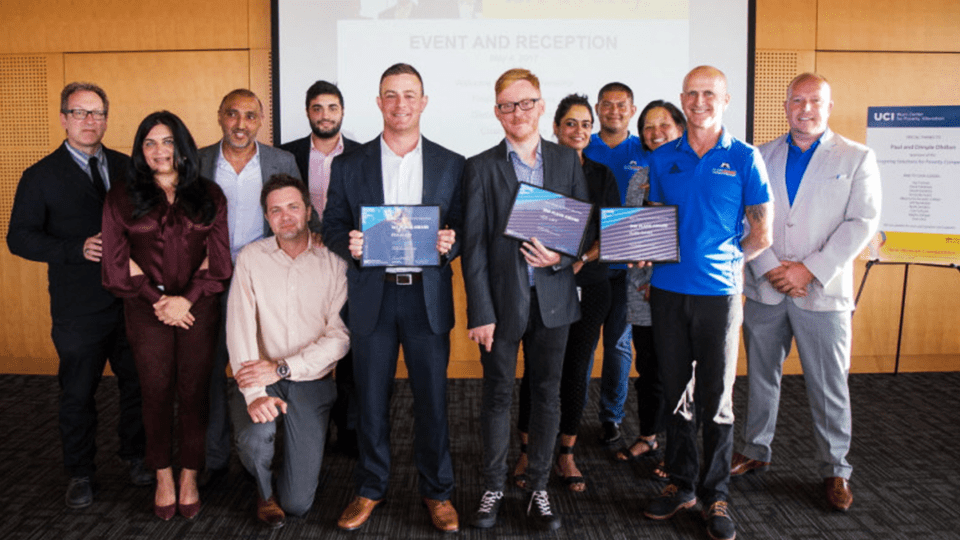IRVINE — Chad Trainer’s business idea was born out of his own struggle to find a job.
Trainer, who had a desire to help others, graduated in 2008 from the University of Virginia law school, one of the best in the country. He hoped to land a job in public interest law, but his search was in the midst of the global financial crisis and he couldn’t find one. He even moved to Russia in search of an opportunity.
“I finally ended up working for a firm, which is absolutely not what I wanted to do,” Trainer said. “I worked there for a month and decided this is not for me.”
Then he saw the startup culture in San Francisco and realized technology is the answer to many problems, including his own. He founded Esqalate, a nonprofit group that uses online services to connect law school graduates with experienced attorneys so they can provide free or low-cost services to poor clients.
Trainer’s nonprofit service received affirmation Thursday, May 4, winning the third annual Designing Solutions for Poverty Competition hosted by UC Irvine’s Blum Center for Poverty Alleviation. Esqalate finished first among 42 entries in the Shark Tank-style pitch contest aimed at finding innovative business ideas to help those in poverty here in Orange County and around the world.
Judges evaluated the entries largely on two criteria: Whether the business can generate enough revenue to support itself and how much impact it has on solving poverty.
Richard Matthew, director of the Blum Center, said millennials want to work for and start businesses that are ethical and address health, educational and environmental challenges. The competition, open to the public, allows these young people to get advice from entrepreneurs and develop their ideas, he said.
“It’s natural for Orange County because you have a lot of entrepreneurs here and you have a lot of students who want to do good,” Matthew said.
Dressed in a dark suit, Trainer presented his business model to the crowd gathered at the top floor of UC Irvine’s business school building overlooking the campus Thursday. He started off by describing the hardships of those who are wrongfully evicted from their homes but cannot afford a lawyer to fight their case in court.
After Trainer committed himself to running Esqalate, the 37-year-old moved to Costa Mesa from San Francisco so he could save money by living with his mother. He now works out of UC Irvine’s Wayfinder incubator, which provides mentors and other resources to help early startups, with cofounder and chief technology officer Ilja Goushcha, web developer Nazariy Dubnytskkyy and graphic designer Viacheslav Fonderkin.
Esqalate runs two online services, Proboknow, offering “pro bono” work or free legal representation for the poorest of the poor, and Lowboknow, where clients can seek low-cost offers from attorneys who pay a subscription fee.
The system lets law school graduates gain mentorship and work experience, Trainer said. Meanwhile, experienced attorneys can get their help in providing charitable work.
The two services launched in April 2016 and have raised $100,000. Winning the Designing Solutions for Poverty Competition will add $10,000 in prize money, provided by Orange County investors Paul and Dimple Dhillon.
“It is such a tremendous honor,” Trainer said Thursday. “It has definitely given us a boost.”
The following entries tied for second place and received $5,000 each:
Loy Loy: A board game that teaches people about savings. Members of UC Irvine’s Institute for Money, Technology & Financial Inclusion say they plan to introduce the game in both low-income and wealthier communities so everyone understands the social and economic dynamics of poverty.
Pure Game: A Santa Ana-based nonprofit organization that provides mentors to help children develop character through soccer. Its programs teach children how to break free from their current circumstances and negative mindsets, organizers said.
Some entries were still at a conceptual stage, while others like Esqalate and Pure Game had already launched, Matthew said.
“We are hoping that … we identify a team where they don’t just have a good idea, they also want to implement it,” he said.
Written by Tomoya Shimura, originally published in the Orange County Register: Read the original article here.

